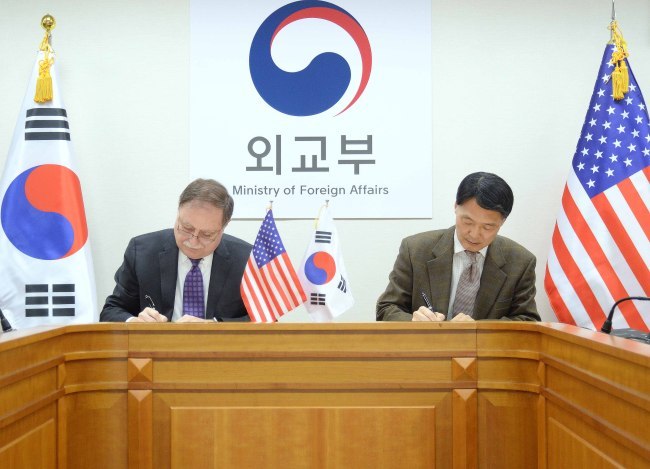Korea will spend some 1.04 trillion won ($925 million) this year to help pay for the stationing of US troops here, under an agreement that was preliminarily signed Sunday.
Seoul has shared the financial burden for the 28,500-strong US Forces Korea since 1991 under the Special Measures Agreement.
Korea’s contributions, increased by 8.2 percent this year, are spent to pay wages for Koreans hired by the USFK, for military construction and on logistics.
Seoul has shared the financial burden for the 28,500-strong US Forces Korea since 1991 under the Special Measures Agreement.
Korea’s contributions, increased by 8.2 percent this year, are spent to pay wages for Koreans hired by the USFK, for military construction and on logistics.

The Ministry of National Defense and USFK command will decide how the money will be allocated in further discussions.
Last year, 46.3 percent of the 960 billion won that Korea paid for the stationing of USFK was set aside for military construction expenses. Thirty-nine percent was earmarked for wages for Korean employees and another 15 percent was for military supplies.
The Korean government was supposed to pay no more than 75 percent of the total wages for Korean staff hired by the USFK. In the provisional deal signed Sunday, however, that cap was removed.
Military construction expenses have been spent on building barracks, warehouses, training grounds and strategic and information facilities.
Logistics costs, which are provided entirely in kind, are for ammunition logistics -- the distribution and storage of petroleum, oils and lubricants -- as well as repair and maintenance services.
“Most of our contributions for the cost-sharing is returned to the Korean economy by helping create jobs, boost domestic consumption and develop regional economy,” the Ministry of Defense said.
The US, under an expanding budget deficit, has requested Korea increase its contributions.
Washington had asked Seoul to increase the contributions by more than 1 trillion won in the ninth SMA talks last year, according to a ministry official.
In the latest round of SMA talks, the US asked for an increase of $1 billion until just before reaching an agreement.
In addition to the cost-sharing under SMA, the Korean government supports USFK directly and indirectly to strengthen the allies’ joint defense and guarantee conditions for the US troops in Korea.
According to the 2018 defense white paper, in 2015 Seoul spent 15.4 billion won for using US communication lines and US digital command system called the C4I, 9.8 billion won to run the Korean Augmentation Troops to the US Army and 8.2 billion won for maintenance of areas around the USFK bases.
Seoul has also spent some 1.45 trillion won outside its defense budget to build roads around the USFK base in Pyeongtaek, Gyeonggi Province.
Korea’s direct support for US troops, including cost-sharing under SMA, amounted to some 2.43 trillion won in 2015.
Indirect support amounted to some 958.9 billion won, which includes the lost lease for the land provided free of charge to the USFK (710 billion won); use of training grounds, exemption of tariffs, inland taxes, local taxes and petroleum import taxes; reduction and exemption of fees for water and sewage, electricity, gas and telephone use; and exemption of fees for the use of airports and railways.
Seoul has continued to spend similar amounts for direct and indirect support of the USFK since 2015, according to a ministry official.
By Kim So-hyun (sophie@heraldcorp.com)



















![[Today’s K-pop] Treasure to publish magazine for debut anniversary](http://res.heraldm.com/phpwas/restmb_idxmake.php?idx=642&simg=/content/image/2024/07/26/20240726050551_0.jpg&u=)